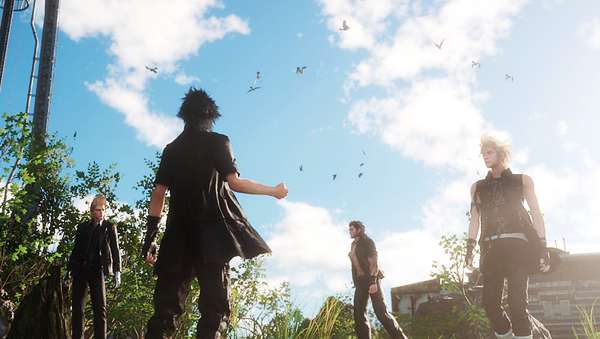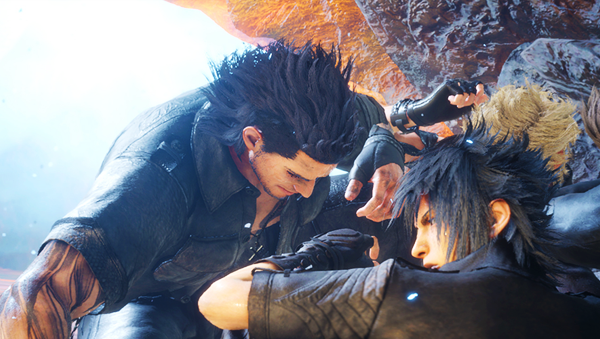Last Wednesday’s Uncovered: Final Fantasy XV event revealed that Final Fantasy XV will finally come out later this year—ten years after being originally announced back in 2006. It is a game that is well-known both among fans and non-fans of the series due to its unique development history. There are a variety of reasons as to why so many people are anticipating the upcoming installment of one of the most beloved series of all time, and some Western fans are hoping that it will bring the JRPG genre back to the forefront after being in decline for the past few years.
In many ways, Final Fantasy XV could set a precedent for its genre—but what about beyond that? What about its messages and social values? Games are an art to be critiqued not only on their mechanics and visual presentation, but also in what they represent and say. Hajime Tabata, the game’s director, has made it clear that the game is being made with an international audience in mind, which is why they are incorporating influences from different cultures into various locations and aspects of the game.
So what will Final Fantasy XV—with such a massive amount of attention focused on its release—have to say to such a wide audience? The thing is, we do not necessarily have to wait until September 30, 2016 to find out, because it seems to already be saying something—something important about masculinity.
Final Fantasy XV centers around Noctis Lucis Caelum, the prince and heir to the throne of the kingdom of Lucis, as he embarks on a journey with his group of three friends in order to try and organize peace in a troubled nation descending into war. Noctis’ group consists of Ignis Scientia, his royal adviser; Gladiolus Amicitia, his bodyguard; and Prompto Argentum, the playful and more lighthearted companion of the bunch.
Tabata says it is a story about “boys being boys,” and the creative decision to feature the first ever all-br0 playable cast in a mainline Final Fantasy game has garnered a lot of concern and criticism. The series has been known for its variety of empowering lady characters, so it is understandable that there has been a lot of discussion.
Do not get me wrong—I definitely have a few thoughts and concerns about the women in the game so far. There is, as of right now, a disproportionate amount of men to women, and while quality matters over quantity, the game seems to be pretty bro-centric in both quantity and presence. The numerous problems with Cindy Aurum’s outfit are still incredibly hard to ignore; one can wonder about the practicalities of Aranea Highwind’s revealing armor; and so far, I’m waiting to be shown rather than be told as to how Lunafreya, the game’s main heroine, is a character with her own agency and narrative outside of being betrothed to Noctis.
However, there is also a conversation to be had about the men in the game—specifically, about Noctis and his group of friends.
ut men are dependent on a narrative with a very specific definition of what it means to be a man. The patriarchy and society’s gender norms impact women in an overwhelming amount of ways, but they also affect men in the sense that they must adhere to a very specific idea of manhood. Men must be dominant, and in turn, women must be submissive. Men must not cry, show emotions, or display weakness; they must be tough and independent. Men must not act too familiar with each other, and if they do, there is a societal pressure to reassure themselves and others of their masculinity—because, obviously, being very friendly and emotionally honest is a potential threat to that.
But so far, Final Fantasy XV is not incorporating any of these elements into its story about the bonds between this band of young men; the narrative it seems to be presenting about relationships between men is not one that relies on toxic masculinity. It is telling a story about a group of close friends while having them openly display their love for each other as they cover each other in battle, pick each other up when they fall down, and make sure that they’re all okay. They do not have any problems with sharing tents, having close physical contact, or giving each other compliments and affection. Despite being so different, the members of the group genuinely care about each other, and it is a beautiful thing to see them be so protective both on and off the battlefield.
One of the group members, Ignis, is particularly interesting. He is Noctis’ royal adviser and his main tactician, but he also has a role that has been traditionally given to women: the motherhood role. In the first episode of the Brotherhood: Final Fantasy XV anime, he is revealed to constantly argue with Noctis over his reluctance in eating his vegetables, not unlike a mother and a child. He is the group cook and always makes their meals on the road, and he seems to take a lot of pride in this role.
The fact that he cooks meals or acts as a sort of mother figure to the group is not portrayed as an attack on his masculinity in any way, and it’s a wonderful and refreshing subversion of the expectations that much of the gaming community typically has for characters who are men. It’s a bit of a bold move in a medium where its community tends to approach any feminine traits in men with disagreement, aggression, or hostility.
This portrayal of healthy masculinity and intimate friendships between men is, in part, due to cultural influences. It is something that is more commonly seen in Japan than in the West, where there is a bigger presence of machismo and a far more rigid idea of what classifies as ‘masculine.’ We have even previously seen something similar in the series through Final Fantasy X in which the game’s protagonist, Tidus,is allowed to openly complain, cry, and be terrified while still helping Yuna save the day. This happening in a JRPG isn’t an overly new thing; however, this is one of the few times where a JRPG gets this much widespread attention in the West.
With all of the attention being given to this game, it could possibly influence mainstream Western games to at least consider portraying these types of roles and relationships among men more often. Perhaps in the future, there will be some change in an industry that overwhelmingly defines manhood as shooting big guns and being stoic.
Conversations about gender don’t stop at just the distinction between men and women—they can and should go far deeper than that. The conversation about the women in the game is an extremely vital one that should happen, but it is also possible to have a conversation about the ways in which this game could be a positive step towards portraying healthy masculinity. This is the story that Square Enix wants to tell with Final Fantasy XV, and I feel like it is one that will stand out as an example for the different ways in which stories about men can be told.


No comments:
Post a Comment